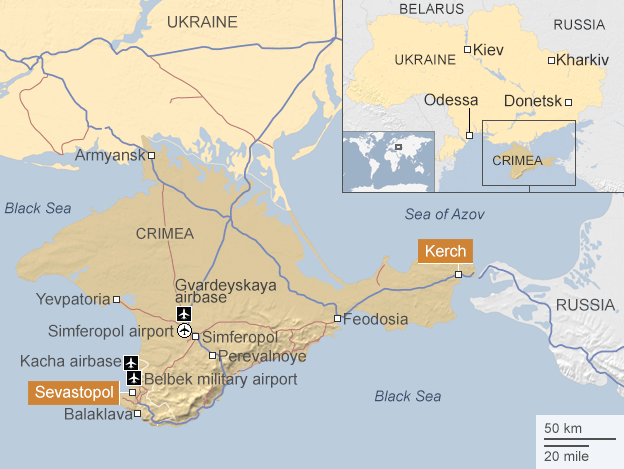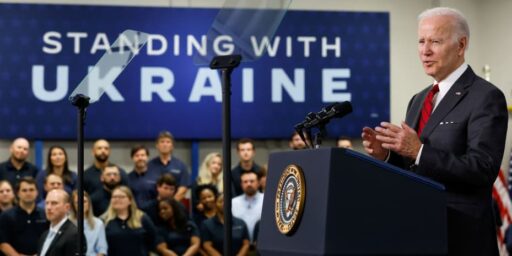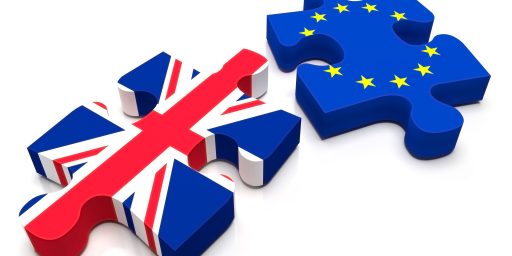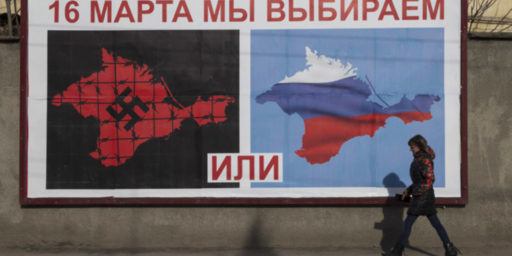Divisions in Crimea
Crimea is more divided than Russia would have the world believe. Plus: the Crimean government has no legitimacy at the moment.
 Via the BBC: Crimean’s loyalties split despite leaders’ certainties.
Via the BBC: Crimean’s loyalties split despite leaders’ certainties.
The current leadership:
The law was rushed through the autonomous province’s parliament, with 79 of 81 MPs backing the proposal to leave Ukraine.
[…]
Crimea’s First Deputy Prime Minister Rustam Temirgaliev told me he was certain of victory.
“Ukrainians will become Russian citizens here”, he said. “We will win this vote with 70 or 75%. The referendum is legitimate.”
The more complex reality:
Crimean Russians are split, perhaps by generation. Lena’s mother, Irina, remembers 1954, when Crimea was given to Ukraine by the former Soviet leader Khruschev in a move that many here still resent. “I would vote yes in a referendum”, she says. “Crimea has always been a Russian land and I don’t have any emotional bonds with Ukraine.”
Aside from the Russians, there is a sizeable community of ethnic Ukrainians and Crimean Tatars, who together make up around 40% of the population. They would both certainly reject changing nationality.
The Tatars were deported by Stalin to Central Asia in 1944, as punishment for alleged collaboration with the Nazis by some. Many died, and even after some eventually returned, they remained fiercely anti-Russian.
And that is the problem here. Within this small, rugged peninsula, the divisions are so deep that nothing can satisfy everyone.
All of this sums to the fact that if this referendum is overwhelmingly in favor of joining Russia that there is no way that such numbers could reflect a democratic reality on the ground. But, of course, the only way an argument can be made that the referendum has any legitimacy is if it shows a truly overwhelming majority in favor.
As such, it seems unlikely that the referendum will actually provide any kind of real resolution. (Unless, I suppose, it is held and leaving Ukraine fails, but I have a hard time seeing the Russians allowing that to happen).
Of course, the reason that the current leadership is speaking as it is is because it is not a legitimate, representative government, but is instead puppets of an occupying force.
Via USAT: Analysts call Crimea’s Parliament a fake government
“This (Crimea government) is a fake parliament because it was not elected and it was proclaimed under the Russian occupation — the democratic procedure under the guns of a foreign army does not work,” said Yaroslav Pylynskyi, director of the Kennan Institute at the Wilson Center, a policy research institute in Kiev.
“The fact is that the procedure of the change of the government and the parliament in Crimea was under the guns of a foreign army so a fake parliament adopted a fake government,” he said.
Specifically:
Armed men assumed to be Russian troops or pro-Russian militia stormed the Crimea Parliament building and locked it down. Anatoly Mogiliov, the president of Crimea, who is a member of Yanukovych’s Party of Regions, was ordered out.
In a session not open to the public, the Crimea parliament allegedly appointed Sergei Askyonov as prime minister of Crimea. Askyonov is a member of a small, obscure political group called from the Russian Unity Party, which won too few votes in parliamentary elections in 2012 to win even one seat in Kiev.
Businessman Alexei Chaly announced he was mayor of Sevastopol, elected he said in a rally Feb. 23 and named chairman of Sevastopol’s executive committee, which did not exist in the city previously. He is running the city and said he is backed by Moscow.
As such, it is impossible to argue that the current “government” in Crimea has any legitimacy (or is legal, for that matter).






This goes back to a question I asked early in the crisis, what’s the unit of measure of sovereignty? That was, coincidentally, the question asked by Woodrow Wilson’s Secretary of State when Wilson gave his “14 Points” speech.
The big problem is that neither Russia nor Ukraine have any tradition of or structures for the preservation of minority rights.
And some people wonder why the Russians are being compared to the NAZIs. See Austrian referendum on annexation that wasn’t allowed to go forward until the Germans were on the ground.
The problem with the Nazi analogy isn’t so much the tactics used. I think we all understand that the tactics used are similar to what Hitler used in Austria and Czechoslovakia. Those tactics weren’t original with him BTW. The Unites States used similar tactics in Texas and Hawaii, as well as in its dealings with the native Americans.
The problem with the Nazi analogy is that we fought WW2 to stop Hitler. Do we want to fight WW3 to stop Putin?
(Channeling Bismarck: The Great War will be out of some foolishness in Eastern Europe)).
@Stonetools:
That should be the next Great War. Curses, Apple autocorrect.
Two choices in the referendum: join Russia now or join Russia later.
@PD Shaw: Ironic there are billboards going up around Crimea that say on March 16th we choose between a Nazi Crimea and a Russian Crimea with the region displayed side by side in the flag of either.
http://www.newyorker.com/online/blogs/newsdesk/2014/03/who-will-protect-the-crimean-tatars.html
The tactics are Hitlerian. Is the strategy Hitlerian? Well, the problem with that question is that Hitler never had a strategy, he acted on an ad hoc basis, driven by his demons, but with no real-world plan for what to do next.
What else might Putin want? Is his dream to reconstitute the old USSR? I suspect that’s exactly it. He’ll find one hell of an indigestible meal if he tries to swallow the ‘Stans, which leaves the Baltic countries looking like the best targets.
Are there ethnic Russians in the Baltics? Do they feel put-upon by the Scandinavians?
We can’t do a thing for Crimea. We can do a little, but perhaps not enough for Western Ukraine. But we can do a lot for the Baltics. We should begin by establishing permanent observers under UN auspices to monitor treatment of the Russian minority, because that’s where Putin’s disinformation would start. We should arm the three governments to the extent they can absorb and make it crystal clear that this is the new Poland, this is where the West can and will fight. Poland should be bolstered as well, obviously. And we should remind China that Putin is right on their border.
I don’t think the world is buying Putin’s bullsh!t. This is an opportunity for us.
The problem here is that there is bullsh!t on both sides. When Kerry piously intones that countries shouldn’t invade other foreign countries one imagines people all over the world bursting out in incredulous laughter at the US’s unmitigated gall. When Bush Administration spokes people like David Frum and Condoleeza Rice refer to Russia as an “outlaw nation ” one wonders when did irony die.
Now “me too” is logically not an argument against present wrongdoing, but in the court of public opinion it works quite well. I think the US should just acknowledge up front it has not always followed the “don’t invade, etc” principle while insisting that Russia follow the rule in this case. At least we’ll get points for honesty.
@stonetools:
I don’t think “me too” will matter much to the nations on Russia’s periphery. We didn’t invent hypocrisy. What will matter is that only the US can strengthen nations at risk. Principle is beside the point, we’re talking power and survival now.
@michael reynolds:
In 20 days the three Baltic countries will celebrate having been members of NATO for a decade. They aren’t a target for Russia, unless Russia wants to start World War 3. Also, they are Balts, not Scandinavians.
@michael reynolds:
The problem with the realpolitik approach is that it can just as easily be used to justify intervention in Ukraine, on the ground that anything that blocks Putin’s westward advance helps the USA and that that helping Ukraine is justifiable on the “enemy of my enemy is my friend” principle. Bismarck himself was quite the military interventionist, when it suited Prussia’s interest.
What would Bismarck do? My guess its that he would try to stop Putin but if it was too costly to oppose Putin he would make a deal. I think the best deal is obvious: Russia gets back Crimea and the West keeps the rest of a unified Ukraine. Even that deal would mean that that the West would have to extend (again!) a big loan to Ukraine. To be blunt, I would be asking for all kinds of guarantees that the money wouldn’t get frittered away again, up to and including the EU or the IMF taking a direct hand in the government of Ukraine-to the extent of a receiver running a bankrupt company. If the Ukrainians objected, I would refer them to the Russian option. In all this, the Crimean Tatars would get sold out once again and we might see a new exodus of Tatars. And so another small, weak ethnic group gets screwed again.
@PJ:
All three of those countries have large, restless Russian minorities who are chafing at what they see as discriminatory legislation by the Baltic majority. There is a Russian enclave-Kaliningrad-that’s on the southern border of those republics. Again, take a look at a map. Russia can make a lot of mischief, I bet.
@stonetools:
No, only two of the countries have large Russian minorities.
I already know what the area looks like, I have no need to look at a map.
Do you have examples of what you think Russia might do?
Again, the countries have been members of NATO for a decade.
@stonetools:
You are correct as to Latvia and Lithuania. Estonians are Finnic, which I should not have lumped in with Scandinavians.
The fact that they’ve been in NATO for a decade is only as relevant as NATO is determined. NATO membership isn’t a magic potion, countries allied to France and the UK were picked off during Hitler’s early days, notably Czechoslovakia whose security had supposedly been underwritten by France, then considered a very major military power. France and the Brits handed Czechoslovakia over to Hitler.
Ukraine had reason to believe Europe and the US would at least support their sovereignty, a false hope given the geography. But is the geography better for the Estonia, Latvia and Lithuania?
Will Germans fight for Estonia? How about the French? The Brits? Or, in the face of a determined effort by the Russians, would they reconsider? A quarter of the Estonian population is Russian. Are they concentrated in areas that might, like Crimea (or the Sudetenland) be peeled away?
Oops, directed that to the wrong person.
@michael reynolds:
Take a look at Russians in Estonia from Wikipedia. Sure, the Ida-Viru County has 70+% Russians, and they may very well be able to force some sort of referendum on joining Russia, I can’t say I know the laws in Estonia. But just because there are a lot of Russians in the county doesn’t mean that they would actually want to join Russia, and Russia would not be able to do what they are currently doing in the Crimea.
@PJ:
You manufacture an incident, make it look as if Estonians are beating up on ethnic Russians. In Crimea Putin apparently didn’t even bother with this, just announced that Russians were being picked on.
Or you just roll the tanks one day. And NATO does what? Sends ground troops from Germany? Sends a Marine force sailing up to land at Tallinn? To accomplish what?
I don’t think this is likely, I’d say the odds are long. But history does not reassure me on the fate of unarmed nations who rely on western assurances in the face of a frisky and bold dictator.
@michael reynolds:
Lets say that they do that, which I don’t see as plausible. Then what? Would they annex the Ida-Viru County? That would get them nothing, or are you arguing that Russia would invade and annex the entire country?
Crimea has a year-round ice-free port, something that Russia proper doesn’t have, that’s the main reason for what current is happening, that and Russian fears about losing influence in the Ukraine and what would happen with the access when the Ukraine moves towards the west and joins the EU and NATO.
@PJ:
Stop exporting energy from Kaliningrad. No, not from the nuclear power plant that they may or may not still be building, from the natural gas power plant that’s been there for decades.
I stand corrected on the ethnicity of Lithuania. For the record, I note that :
1.Putin has said that the fall of the USSR was a tragedy, and people have interpreted his moves as trying to resurrect the USSR.
2. The Baltics were part of the USSR.
3. As Michael has pointed out, the NATO military options aren’t good.(The generals aren’t talking, but I’m sure if you gave them truth serum, they would say that NATO enlargement to the Baltics was a dumb idea)
4. Putin probably has some economic pressure options we don’t know about.
But we are getting ahead of ourselves.One crisis at a time. What’s Putin going to do with the Ukraine? I recommend this New Yorker article:
I’m not a believer of the “Great Man” theory of history , but Ukraine could really use a Vaclaw Havel about now.
Ineptitude of Ukrainian leadership is one reason to be pessimistic about Ukraine.It might still fall apart all by itself. But according to the New Yorker article, even most Russians oppose a Putin intervention in Ukraine. So Putin might not go beyond Crimea.
@PJ:
The Russian use of the Crimea was never in doubt. No one was proposing shutting out the Russian Navy. The Ukraine was nowhere near joining the EU. And there was no oppression of Russians on the peninsula. This was a basically rather stupid move by Putin seizing what he already controlled, scaring his neighbors, pissing off the west all right after he spent billions in Socchi trying to play the big, cuddly bear. I don’t think Putin was behaving rationally, and I guess I don’t see why we’d assume rationality going forward. National leaders frequently do stupid things for reasons of ego or for domestic consumption or in service to some grand vision.
Look, I don’t personally think Putin is Hitler, and Russia 2014 sure isn’t Germany 1938, but Putin’s moves in Georgia and now the Crimea have a bad odor about them. I don’t assume he’s either rational or benign. He’s a secret policemen given absolute power over a restive nation that fee;s itself humiliated and marginalized.
Part of the reason I’m not entirely willing to dismiss this as unimportant is no doubt that I’m neck deep in WW2 stuff for a job I’m doing. That’s undoubtedly heightening my paranoia, so I don’t take it too seriously.
But I keep asking myself, what could the French and British have done in 1938 and 39? There were ethno/linguistic Germans in Czechoslovakia. They were mildly oppressed by the Slavs. Why shouldn’t Hitler have the Sudetenland? And in any case, what was the French army going to do about it? And once they’d accepted the simple reality that they couldn’t stop Hitler there or in taking the rest of Czechoslovakia, why should they quibble over similar demands made elsewhere? They assumed Poland was safe because of Stalin, never seeing the Molotov-Ribbentrop pact coming.
People sit back with the benefit of 70 years’ history and think well, someone should have done something. But who? And what? How?
So while I categorically do not equate Putin with Hitler, still less Russia with Germany, I’m still seeing a thuggish dictator taking first Georgia and now Crimea, and exposing the fact that no one can really stop him. And when it’s suggested NATO membership confers total security, I go back to Poland relying on western guarantees. The west finally went to war over Poland, but that didn’t save Poland.
@michael reynolds:
More from the New Yorker article:
So he is a paranoid Russian authoritarian. That doesn’t mean crazy though. I think he can be deterred. Let’s not fall into the trap of saying he will only respond to force. That way lies war, and nobody wants that.
I don’t think a 40% minority should be able to thwart the will of a 60% majority. What, we are applying U.S. Senates rules to the rest of the world?
@Raoul: On something like leaving one country and joining another, I think a supermajority might well be in order, to be honest.
I appreciate your response and do agree somewhat with the presupposition. Alaska became a state with 67% which I think is robust- should Puerto Rico become a state with 51% or 55% of the vote in a plebiscite? I would say yes to 55% (I have a vested interest)-many of the southern states in the union were incorporated back with only 50%, even less. I think the modern age has created easy divisions that make large majorities on any issue virtually impossible. No president in this country has ever been elected with past 60% of the vote. A big factor about Crimea is that is is de facto politically Russian, so I think a vote is more a ratification than a secession (and unification). Anyways, there is no magic formula but when arguing that a minority can stymie a majority, special attention must be paid.
@Raoul: But those are not comparable cases.
Puerto Ricans are citizens of the US whether PR becomes a state or not. That is radically different than allowing 51% of the population make 49% become citizens of another country.
Likewise, re-admission to the union after the Civil War was a wholly different issue as well.
Keep in mind too, joining Russia means joining a clearly non-democratic polity. (Ukraine has its problems, but it is more democratic than Russia, without a doubt).
(I would also be more sympathetic to local calls to join Russia if there weren’t Russian troops on the ground).
Read several times that Vladi used to tell George “If you take the Ukraine, then I’m taking Crimea.”
I suspect that to him, he’s simply keeping his word. Why did we have Vicky Nuland Kagan running around messing with the Ukraine? Vladi has a tendency to think we are always hatching plots against him, and have vast capability’s in the area of sparking up-risings. We were mighty slick in organizing the underground opposition in Serbia, so that may be were it comes from. Doesn’t matter. It’s the way he feels about it, that’s all that counts.
Looks to me his position is now “Feb 21 deal or I’m keeping Crimea”, his “Alamo”. That’s his naval base, period. The not admitting those a Russian troops may be a bit of slick. He can withdraw them without losing face, we can talk the new government into going for the Feb 1 bailout deal without losing face as well. Frankly, the fate of dept ridden countries in the EU and under the IMF is not all the cool. Maybe it would be better to let Vladi foot the bill for this one?
Slim chance, as Kerry is an oaf, unlikely to see the door Putin is leaving open, and by the look of it, the entire State Dept under Hillary has become infused with “save the world” neocons, like the Kagans. All the old realpolitik guys are gone, anyway. I get the feeling that we are only capable of talking past each other at the moment.